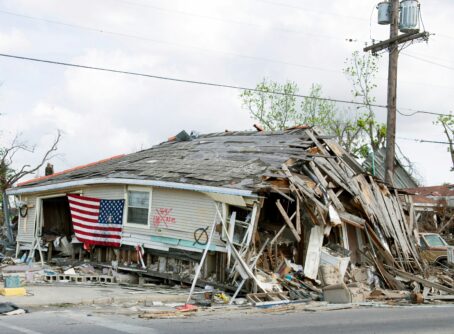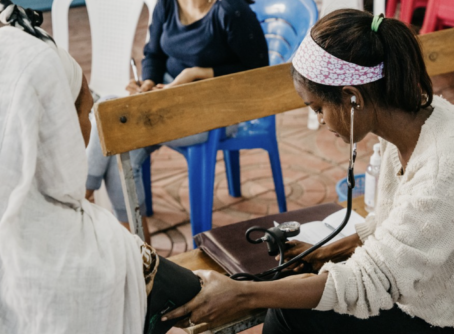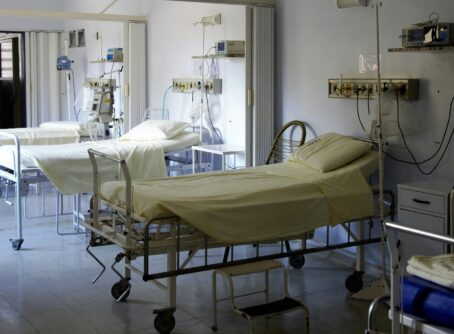
This article is part of our series exploring the role of faith-based organizations in providing vital support and care to those affected by HIV/AIDS through PEPFAR. Throughout this series, we will highlight the importance of a clean, five-year reauthorization of PEPFAR to ensure the stability and continuity of lifesaving treatment.
TW: This article discusses sexual assault.
Consecrated Collaboration
“The first time I met her, her eyes had no glimmer and she had no hope,” Jenna Gloggin. Gloggin was a nurse at Hope Worldwide in Kenya, an international charity that serves nearly 1 million people annually on every inhabited continent by offering “sustainable, high-impact, community-based services to the materially poor and needy.” The story Gloggin recounted was that of Jane*, who contracted HIV after being raped at age 12. Against her will and without her consent, she contracted a lifelong disease that she would be destined to pass on to her children and grandchildren. In countries without treatment, the effects of HIV/AIDS can be devastating, attacking the immune system and leading to subsequent death. The ravages of this disease extend past physical effects, causing stigma and isolation from communities for 39.9 million people, largely women and children, living with HIV worldwide. The President’s Emergency Plan for AIDS Relief (PEPFAR) is the largest initiative ever undertaken by a single nation to address a single disease. Since its launch in 2003, PEPFAR has provided funding and lifesaving treatment to over 25 million people in more than 50 countries. As a bipartisan effort, PEPFAR demonstrates the global reach of U.S. compassion and leadership. Over the past two decades, PEPFAR has provided antiretroviral (ARV) treatment to millions, supported over 342,000 health workers, and enabled 7.8 million babies to be born HIV-free. More than seven million orphans have received care, and HIV-related deaths have dramatically declined. At the core of this success is antiretroviral therapy (ART), which the CDC described as “a regimen of medications that suppresses HIV to undetectable levels” when taken consistently. This not only improves quality of life but also makes transmission virtually impossible. By transforming HIV from a fatal disease to a manageable condition, ART has become the cornerstone of the global HIV/AIDS strategy. PEPFAR stands as a vital, justice-centered initiative that not only embodies Christian compassion but also offers a uniquely powerful path to eradicating HIV/AIDS and uplifting the most vulnerable globally. Specifically, PEPFAR is especially effective when empowered by faith-based organizations (FBOs).
By leveraging their credibility, access, and long-standing relationships, FBOs extend PEPFAR’s reach into remote areas and marginalized populations.
FBOs are uniquely equipped to partner with PEPFAR due to their embedded presence in communities, particularly in regions with limited traditional healthcare systems. A PEPFAR community engagement study states, “In many PEPFAR-supported countries, 60–70% of the population actively participates in religious life.” These faith communities offer consistent, trustworthy relationships and spiritual care that rotating government agencies often cannot match. Their continued presence is both practical and pastoral, caring not only for physical health but also for people’s emotional and spiritual well-being. By leveraging their credibility, access, and long-standing relationships, FBOs extend PEPFAR’s reach into remote areas and marginalized populations. Women and children are at the top of this list, being disproportionately affected, especially in sub-Saharan Africa. Women often bear the brunt of the burden of illness, and without intervention, HIV-positive mothers risk passing the virus to their children during pregnancy, childbirth, or breastfeeding. PEPFAR, in partnership with FBOs, helps prevent this outcome through access to ART and maternal care. Women receiving treatment are equipped to raise healthy, HIV-free children, breaking the cycle of transmission and poverty. Family-centered policies like these affirm that the health of mothers is inseparable from the health of whole communities.
PEPFAR stands as a vital, justice-centered initiative that not only embodies Christian compassion but also offers a uniquely powerful path to eradicating HIV/AIDS and uplifting the most vulnerable globally.
Serving the least of these through Hope Worldwide
This multi-pronged, community-centered approach reflects the biblical call to justice. God calls his people, particularly when they are blessed in positions of power, to steward their privilege and uplift the downtrodden. Leviticus 23:22 reminds us of this call: “When you reap the harvest of your land, do not reap to the very edges of your field or gather the gleanings of your harvest. Leave them for the poor and the foreigner residing among you. I am the LORD your God.” The very heart of God is for the most vulnerable, those who tirelessly glean the leftovers, those who are unwelcome in a new land, and those who feel isolated from community.
Furthermore, God graciously calls us to partner in the pursuit of justice. When we, God’s people, demonstrate generosity toward the poor and the stranger, we bear witness to God’s very nature. Supporting maternal health and family integrity through PEPFAR, therefore, is not merely policy; it is a direct act of justice and mercy toward the world’s most vulnerable, offering Christians an opportunity to contribute to fostering a more equitable world.
When we, God’s people, demonstrate generosity toward the poor and the stranger, we bear witness to God’s very nature.
Organizations like Hope Worldwide demonstrate the life-changing power of faith-based partnerships, particularly in their work with women and children. With over $8 million in PEPFAR funding, Hope Worldwide runs prevention, testing, and counseling programs in both Kenya and Botswana. In sub-Saharan Africa, governments often face significant resource constraints that limit their ability to reach all communities with HIV prevention and treatment efforts. However, when FBOs collaborate with governmental programs, the impact is far-reaching due to their widespread influence and the deep integration of religion within the population. Jane represents 150,000 women and children who have received both ART, pastoral support, and integration into the broader community. Gloggin said the best part of the job is “being a small part of giving women freedom from the bondage of HIV and coming alongside to help them walk in the freedom of Christ.” Hope Worldwide exemplifies how FBOs can bring about both physical and spiritual healing. As this series has consistently affirmed, our faith calls us to a comprehensive understanding of human flourishing—one that intimately connects the physical body with the soul.
Hope Worldwide’s Comprehensive Care
The healing offered through PEPFAR, particularly by FBOs like Hope Worldwide, is a vibrant manifestation of this biblical principle. It transcends mere symptom management to extend God’s grace and offer spiritual restoration that touches the deepest parts of a person. When a woman like Jane receives life-saving medical care, she gains physical liberation from the anguish of HIV. Still, the concurrent pastoral support and community reintegration provide spiritual freedom from the bondage of shame and isolation. This dual focus reflects the ministry of Jesus himself, who consistently healed the sick while simultaneously addressing their spiritual need and restoring them to community, vividly depicted in narratives like the healing of the ten lepers (Luke 17:11-19).
Beyond direct medical care, Hope Worldwide’s women’s economic empowerment programs have trained 743 women in business and vocational skills. Computer training, hair and beauty training, fashion and design training, and business start-up classes enable women to overcome the stigma and barriers associated with poverty. The current administration’s funding freeze has jeopardized access to these life-changing programs for the most vulnerable, and the dissolution of the United States Agency for International Development (USAID) has disrupted HIV testing and displaced many workers responsible for these vocational trainings. Supporting PEPFAR means supporting family-supportive policies and a multifaceted approach that helps women live healthier lives, protect their children, and contribute to their communities. The success of PEPFAR in preventing mother-child transmission of HIV exemplifies how targeted health interventions can have a lasting, positive impact on families, especially in the most vulnerable regions of the world. PEPFAR not only saves lives but also helps to create a future where families can thrive.
Christ’s Call for Global Solidarity
The person of Christ compels us to reject a sidelined approach to suffering, urging us to act and care for others even when their pain feels far removed from our own. In 1 Corinthians 12:26, Paul writes, “If one part suffers, every part suffers with it, if one part is honored, every part rejoices with it.” HIV/AIDS is not a distant issue, but a wound in the global body of Christ. When Christians engage with PEPFAR’s mission, they embody Christ’s call to collectively serve the least, the lost, and the suffering. This global solidarity isn’t merely an obligation; it’s a joyful invitation for the Church to tangibly be the hands and feet of Christ. This invitation is met with even more urgency as the present administration threatens not to reinstate PEPFAR. Advocating at the congressional level against this is a way to ensure we move forward, not backward. Because consistency is key and some of Hope’s partners rely on funding from the government, one practical way people can support PEPFAR is by supporting organizations financially, such as World Relief and Untold, one of Hope International’s savings group partners in East Africa. People can also continuously ask members of Congress and petition for the government to reaffirm the U.S.’ goal to end HIV globally. The present administration seems more concerned with coming up with reasons to be rid of PEPFAR rather than attempts to reinstate; advocating at the congressional level against this is a way to ensure we do not move backwards but forwards.”
The person of Christ compels us to reject a sidelined approach to suffering, urging us to act and care for others even when their pain feels far removed from our own.
As Christians, through advocacy and support for PEPFAR and steadfast FBOs like Hope Worldwide, we can participate directly in His ongoing work of redemption. Jesus did not shy away from the presence of brokenness, for it was in those circumstances that He had the opportunity to reveal Himself fully. May our collective behavior and partnership reflect the boundless hope we find in Christ, and let our actions extend that grace and mercy to every soul and all who glean from the edges.
*An alias was used to protect the source’s identity.
Leah Lisowski is a Physician Assistant student (PA-S1) at Cedarville University. In her free time, you can find her in a healthy balance of dwelling among trees and dwelling among people. How could one be bored in such a wonderous world as this!





